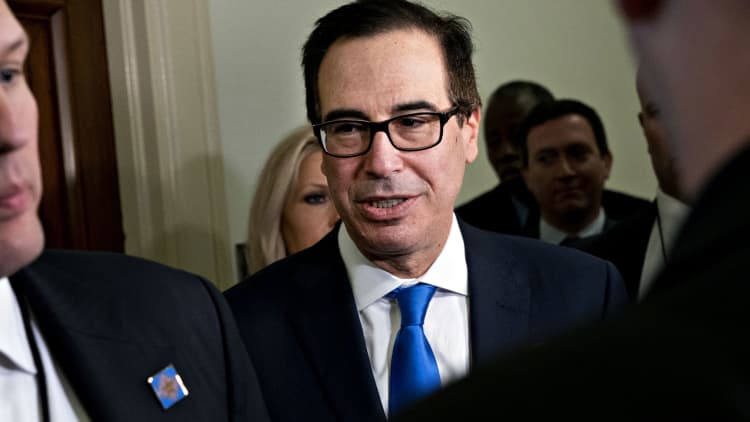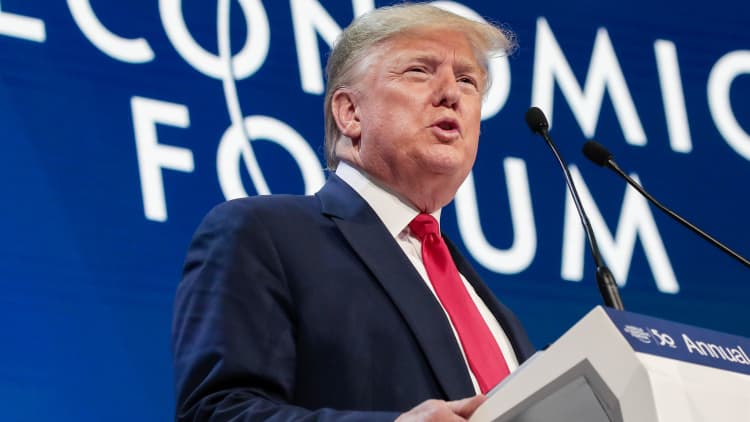With the China "phase one" deal and the United States-Mexico-Canada Agreement signed, the Trump trade team is now turning its attention to a deal with post-Brexit U.K. and the ongoing stalemate at the World Trade Organization.
Questions also remain over the direction of trade discussions between the U.S. and the European Union as the American trade front shifts to targets across the Atlantic. President Donald Trump highlighted the less-than-rosy relations earlier this week from the World Economic Forum in Davos, Switzerland.
Trump said that the European bloc has been "very tough to deal with" and had "taken advantage" of the U.S., but said the EU has "no choice" but to make a deal.
But separate and apart from the tricky talks between the Office of the United States Trade Representative, the EU and the WTO, many investors expect the U.S. to prioritize bilateral talks with the U.K.
At first, it might be tempting to believe the U.S. and U.K. could whisk through a comprehensive deal in contrast to the months of strenuous debate and tariff tit for tat with China. The two nations have for decades defended each other's interests, whether across military theaters in the Middle East or through generous trade dialogue.
But trade officials on both sides are starting to warn that there may be a few hurdles preventing London and Washington from sailing straight into a photo op.
United Kingdom
Formal talks between London and Washington cannot begin until after Britain leaves the EU later this month, but some of the sticking points are already clear. And there's perhaps no greater barrier to an easy deal between London and Washington if U.S. negotiators insist on greater access to Britain's National Health Service.
Considered a crown jewel of the U.K., the NHS provides free public health care at the point of use and, as such, holds a place of utmost importance to both the Conservative and Labour Parties.
Though Prime Minister Boris Johnson has repeatedly said the NHS "is not for sale," comments from Trump last year that the program would be part of a "magnificent" deal scared some in the U.K.
Their angst is that granting outside pharmaceutical companies greater access to health-care contracts could lead the private sector to squeeze even more profit out of the already-cash-strapped program.
"If bipartisan translates over to the U.K., there's at least a rough bipartisan consensus that the NHS is sort of a national treasure of the U.K. even if Tories might think that there is room for improvement," said Anthony Rapa, a trade attorney at Kirkland & Ellis.
A second hurdle to a U.S.-U.K. deal is Britain's commitment to EU food safety standards.
Some of the EU rules most popular among U.K. politicians are those pertaining to food safety. The U.K. has promised in particular to resist U.S. calls for London to purchase its exports of certain farm products. For years, the EU has blocked members from importing U.S. hormone-treated beef and chicken washed with chlorinated water to kill bacteria.

And while meat treated with chlorine washes is deemed safe by the U.S. government, many U.K. officials remain unconvinced. London's Environment Secretary Theresa Villiers, for example, told the BBC earlier this month that "there are legal barriers to the imports and those are going to stay in place."
That could pose a headache to U.S. Trade Representative Robert Lighthizer, who will represent both one of the world's largest exporters of agricultural goods as well as a president who's eager to notch another deal ahead of the 2020 election.
For Lighthizer, Congress, and Trump, striking a comprehensive deal with the U.K. devoid of the "phases" that now mar discussion with China would be welcome relief both as a matter of logistics and of optics. In the aftermath of Johnson's election victory last month, Trump offered his congratulations and hopes for a "massive" deal.
"Britain and the United States will now be free to strike a massive new trade deal after Brexit," Trump said. "This deal has the potential to be far bigger and more lucrative than any deal that could be made with the E.U. Celebrate Boris!"
The stricter food safety standards imposed by the EU are evident in recent U.S. export data to the U.K. Though the U.K. was the United States' fifth-largest goods export market in 2018, agricultural purchases were a fraction of the total.
U.S. goods exports to the U.K. in 2018 were $66.3 billion, with aircraft ($12 billion) and precious metals and stone ($8.5 billion) the leading components. Total exports of all agricultural products to the U.K. in 2018 were worth just $2 billion, with $261 million of wine and beer, $197 million of tree nuts and $109 million of soybeans.
But to Kirkland lawyer Rapa, Britain may be flexible on food safety issues and instead opt to use its stated position to stand by the EU standards as a sort-of bargaining chip in discussions with Washington.
Something similar could be said of London's threats to impose digital taxes against U.S. tech giants, he said, as the U.K. looks to extract the most it can from the EU and Washington.
"The U.K. seems to be sort of pivoting back and forth. Maybe as of a week ago or so, the reporting was that the U.K. was going to prioritize a U.S. trade deal as a way of gaining leverage with the EU. But then remarks that they made just, as of this morning, were that they're now prioritizing the EU over a US trade deal," Rapa said.
"On some level, it's probably kind-of 'Art of the Deal,'" he added.
European Union
U.S. discussions with the EU have yet to find resolution, either.
Trump's recent trip to Davos showed the president's characteristic negotiating style. While the president noted his "great talk" with European Commission President Ursula von der Leyen, he quickly pivoted to threaten to levy huge tariffs on European cars.
"They've taken advantage of our country, the European Union, for many, many years," Trump told CNBC's Joe Kernen on Wednesday. "But I said, look, if we don't get something, I'm going to have to take action, and the action will be very high tariffs on their cars and other things that come into our country."
"Now, saying that, I don't want your audience to get nervous," the president cautioned. "They're going to make a deal, because they have to. They have to. They have no choice."

Despite Trump's conviction of Europe's desperation, multiple EU member states have in recent months threatened, if not imposed, digital services taxes on some of the largest U.S. tech conglomerates. French lawmakers in July approved a new tax on large tech companies like Alphabet and Amazon, sparking outrage from the White House.
"France just put a digital tax on our great American technology companies. If anybody taxes them, it should be their home Country, the USA," Trump tweeted on July 26.
"We will announce a substantial reciprocal action on Macron's foolishness shortly," he promised. "I've always said American wine is better than French wine!"
Though Trump and Macron appeared to reach an agreement to postpone those levies this week, the current threat of auto tariffs looms large for Wall Street on top of the billions of dollars' worth of duties already imposed.
"President Trump's desire for more trade wins is going to continue to bump up against the EU's unwillingness to put agriculture on the table," wrote Bruce Hirsh, principal with Tailwind Global Strategies.
Hirsh, whose previous work includes time as chief international trade counsel on the Senate Finance Committee and deputy assistant USTR for WTO and Multilateral Affairs, added that the EU may try to appease Trump with a flurry of incremental deals but ultimately stick by its food safety rules.
"The EU appears to be trying to appeal to Trump's willingness to settle for quick, small deals by dangling a small regulatory package with a trace of agriculture, but that may not be enough for farmers," he wrote. "Plenty could still go wrong with the Airbus dispute and autos, but the truce over the digital services tax shows the administration is interested in calming the trade waters before the U.S. election."
The Trump administration has already imposed tariffs on billions of dollars' worth of European products.
The USTR earlier this year published multiple lists of European goods worth more than $10 billion that it had hoped to target amid its high-profile dispute with Airbus. In October, Washington moved ahead and imposed tariffs of 10% on large civil aircraft and 25% on agricultural goods from Europe.
That round of sanctions targeted emblematic goods such as French wine and Italian cheese.
Later, CNBC first reported in December that the USTR was weighing tariffs of up to 100% on European products the administration had previously absolved from such duties, including Irish and Scotch whiskies and Cognac.
"Trump also weighed the threat of auto tariffs...again. We continue to believe that despite a temporary truce, subsidies and the DST will remain real issues — and useful rationales for tariffs," wrote Cowen analyst Chris Krueger. "As tariffs halt on the edges of the Pacific, the Atlantic theater is set to escalate — with aviation, consumer goods, agriculture, Big Tech, and energy in the crosshairs."
But tariffs between the U.S. and the EU aren't new to the Trump administration, which in 2018 announced tariffs of 25% on steel and 10% on aluminum imported into the States. The EU responded in kind with tariffs targeting more than $3 billion worth of U.S. goods including bourbon, yachts and motorcycles.
World Trade Organization
The U.S. also remains at odds at the WTO, where its efforts in Geneva have rendered the trade regulator's highest court impotent. Lighthizer and his staff hope to remedy what they view as judicial overreach by the Geneva court, including rulings that limited the U.S.'s ability to protect its domestic manufacturers from imports.
"For far too long, wealthy countries have abused the WTO by exempting themselves from its rules through the use of special and differential treatment," Lighthizer, a longtime lawyer for the steel industry, said in July.
"This unfairness disadvantages American who play by the rules, undermines negotiations at the WTO, and creates an unlevel playing field," he added. "I applaud the President's leadership in demanding fairness and accountability at the WTO, and I look forward to implementing the President's directive."
But those within the Beltway also say the battle at the WTO includes U.S. angst about the rapid rise of rivals like China that take advantage of preferential and outdated trade rules.
Top American trade officials argue they're justified in their efforts to block the appointment of WTO judges and cripple the trade organization until it evolves to start addressing China's market-distorting capitalism.
The American coalition wants to counter Beijing's practice of "dumping" — whereby one state sells goods in the U.S. below cost — that has fanned the entrenched feud.


